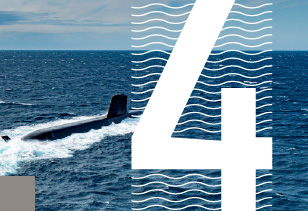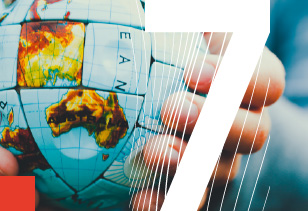2002-2022, TWENTY YEARS OF HELPING TO IMPROVE RADIATION PROTECTION AND NUCLEAR SAFETY FOR IRSN
2022 marks the twentieth anniversary of the publication of IRSN’s incorporation decrees and the definition of its missions. Over the past two decades, its teams have ensured IRSN’s full involvement in radiation protection and nuclear safety and have contributed to its development.
RECOGNITION OF THE ROLE OF TECHNICAL EXPERT
Since its creation, IRSN has carried out expert assessments for a wide range of authorities, ministries, and institutions which periodically express their satisfaction with the institute’s productions. Over the years, IRSN has made its expertise more professional through a continuous improvement process and listening to those for whom its assessments are intended. IRSN is therefore ISO 9001 certified. It also conducts joints audits with the ASN on regulatory processes integrating both an assessment and decision-making phase, in a logic of efficiency of the dual system. At European and international level, the institute has contributed to sharing and converging approaches, methods, and techniques implemented by technical safety organizations (TSO) to meet the expectations of consistency and effectiveness of their actions expressed by EU and non-EU public authorities. IRSN’s involvement, alongside its European counterparts, in the creation of the Eurosafe Forum and ETSON, the European TSO network, reflects this concern. The latter contributed to the international recognition and foundation of technical experts in nuclear safety through the IAEA’s actions, by contributing to the creation of the IAEA’s TSO Forum and the TSO conference, which was held for the first time in France in 2008.
A PARTNERSHIP RESEARCH POLICY
In terms of research, the route taken is also important. Knowing that robust and impartial assessments are based on an ongoing independent research effort aimed at bringing scientific and technical knowledge to industry standards in due time, IRSN has equipped itself with simulation tools and experimental platforms allowing it to cover the main fields of investigation of its experts. It must continue to invest in this area in order to be ready, for example, to assess the dossiers submitted to it, both in the context of extending the operating time of the current reactors and the assessment of new reactor concepts, such as small modular reactors (SMR), or new treatment methods using ionizing radiation.
In accordance with Hcéres recommendations, IRSN has been working on developing structuring research partnerships, for example with the CNRS, Paris-Saclay University, and Gustave Roussy.
It has been involved in the development of European strategic agendas and has consistently responded to calls for nuclear safety and radiation protection research projects from the European Commission.
It is currently at the head of the PIANOFORTE partnership, which organizes all European radiation protection research and involves 58 bodies, including the most important in this field.
The numerous joints projects that IRSN manages or participates in, particularly those financed by the ANR, testify to the scientific quality of the institute’s research. In its recent evaluation, Hcéres highlighted IRSN’s ability to organize and develop this field of activity.
ANTICIPATION OF RADIATION AND NUCLEAR EMERGENCY SITUATIONS
With regard to crisis management, the institute has set up a dedicated technical center and means ready to be sent into the field enabling it to provide the authorities and the public authorities, at their request, with technical, health, and medical insight in all situations involving sources of ionizing radiation, whether they occur in France or abroad, if they are likely to have an impact on it.
As part of its crisis organization, IRSN was thus able to provide its expertise to the public authorities and the public during the Fukushima-Daiichi reactor accident or with regard to the situation of the Ukrainian nuclear power plants following the Russian attack in February 2022. It also regularly participates in national and international crisis exercises aimed at testing their effectiveness.
The methods and tools developed by IRSN are shared internationally, for example with the IAEA or under bilateral relationships.
More generally, the existence, within IRSN, of all the skills and components required to assess the risk linked to ionizing radiation favors synergies between them for the benefit of all its activities. This is particularly the case when preparing for or managing a crisis.
DIALOG WITH CIVIL SOCIETY AT THE HEART OF ACTION
Finally, in terms of dialog with society, the past two decades have seen IRSN’s action move from being essentially based on information giving to a relationship where IRSN’s expertise and civil society questions are shared. This can be seen, for example, in the continuity of technical dialog with society, in relation with ASN and ANCCLI, as part of the fourth periodic review of 900 MWe and 1,300 MWe reactors, or the creation of the ODISCÉ (French acronym for “Opening up and encouraging dialog with civil society on expert assessment”) committee, provided for in its 2019-2023 objectives and performance contract, the role of which is to advise the institute on how to establish new forms of dialog in the field of nuclear and radiation risk assessments.
Within the European Union and internationally, IRSN’s action has been recognized, whether it is its contribution to the implementation of the Aarhus Convention in the nuclear field, or its involvement in dialog set up by ICRP between the inhabitants of the Fukushima prefecture living in an areas contaminated by radioactivity and radiation protection experts, which, month after month, have contributed to the development of a practical radiation protection culture in the population concerned. Another example of an initiative illustrating the evolution of dialog with society is the launch of participatory science projects, such as OpenRadiation, which aims to involve citizens in environmental radiation monitoring.
2023, TOWARDS GROWING CHALLENGES, IN PARTICULAR, IN NUCLEAR SAFETY
IRSN faces unprecedented challenges in all its areas of action.
Developments are the most significant and visible in the field of nuclear safety, in a context of climate and energy crises exacerbated by Russia’s invasion of Ukraine: extension of the operation of EDF reactors beyond 40 years, or even 60 years, commissioning of the EPR, request for the creation of EPR2 reactors, CIGEO, the centralized storage pool, safety options file for the Nuward SMR, fourth generation SMR reactors, anticipation of the effects of climate change, etc.
In the field of nuclear safety, with the development of new technologies in the face of the deployment of new forms of malicious acts, such as malicious cyber acts or the use of drones.
In the field of health, with the development of new diagnosis or treatment techniques using ionizing radiation which must be fully mastered to be used on patients.
Regarding the environment, with the population’s growing concern about this topic and the development of approaches, such as the exposome.
IN THIS CONTEXT, IRSN NEEDS TO ORGANIZE ITSELF
It must, at the same time, build on its fundamentals that recent debates on the development of the safety and radiation protection control system have confirmed, particularly in the context of OPECST’s hearing on this subject:
- the necessary separation between assessment and decision;
- the essential link between expertise and research;
- transparency of its contributions.
It must adapt to the changing context, as it has always done, both in terms of human and financial resources and working methods, in conjunction with all its contacts.
It must maintain and develop skills to respond with relevance and timeliness to major future industrial events and demonstrate a high level of responsiveness.
All IRSN employees, whom we would like to thank for their professionalism and dedication, particularly in recent months, are prepared for this.












